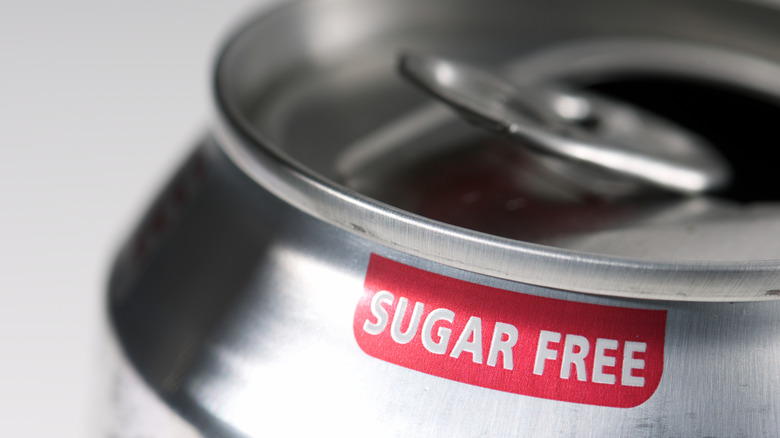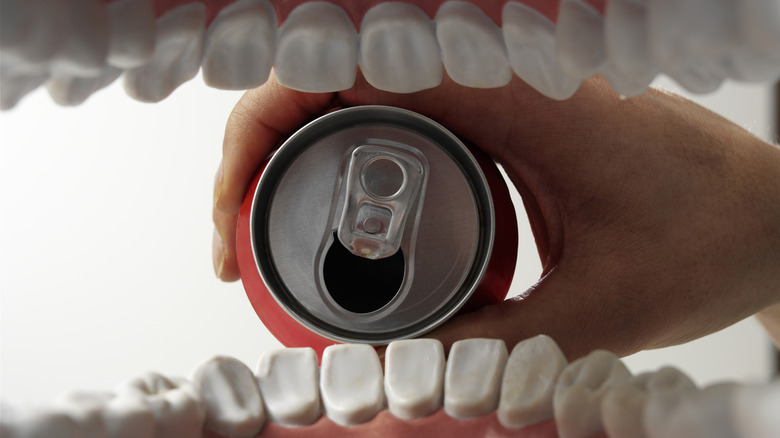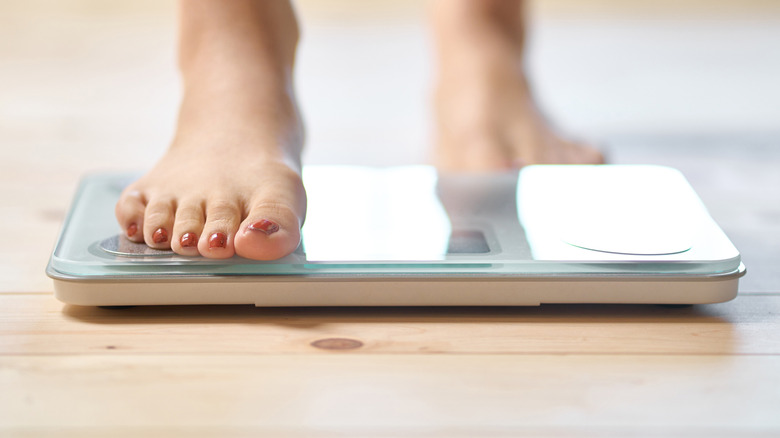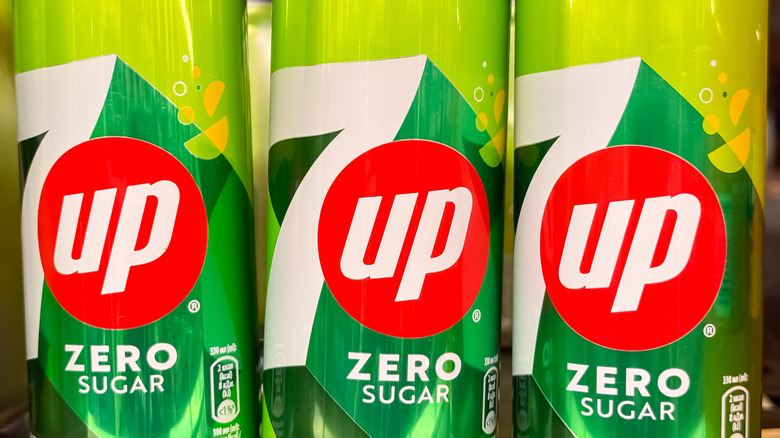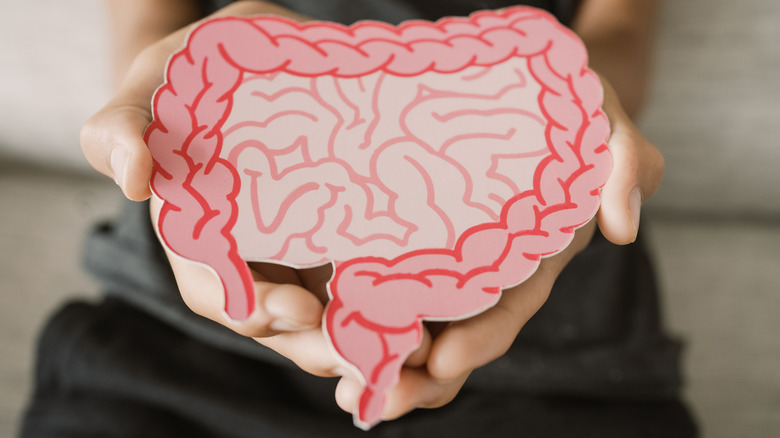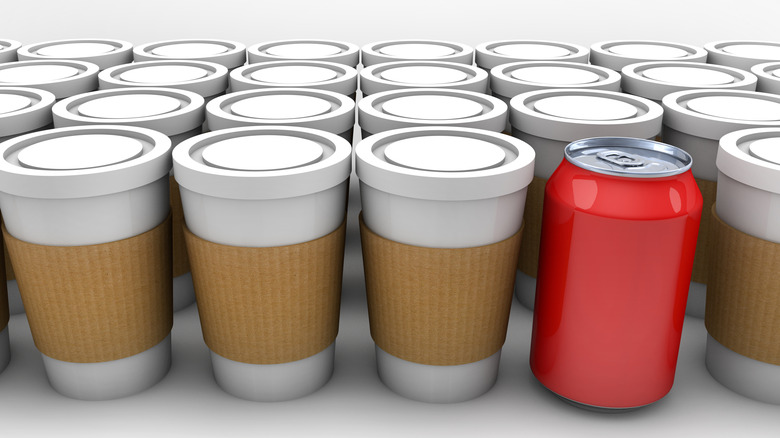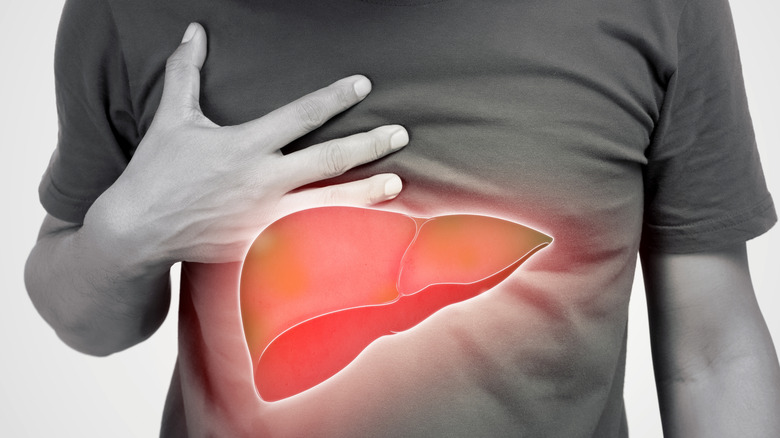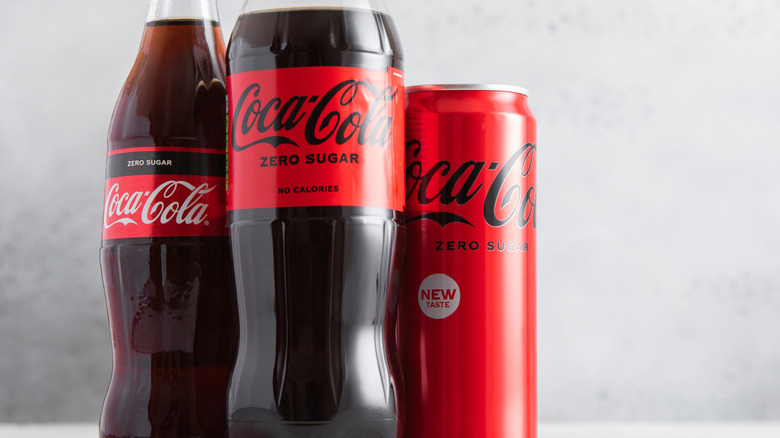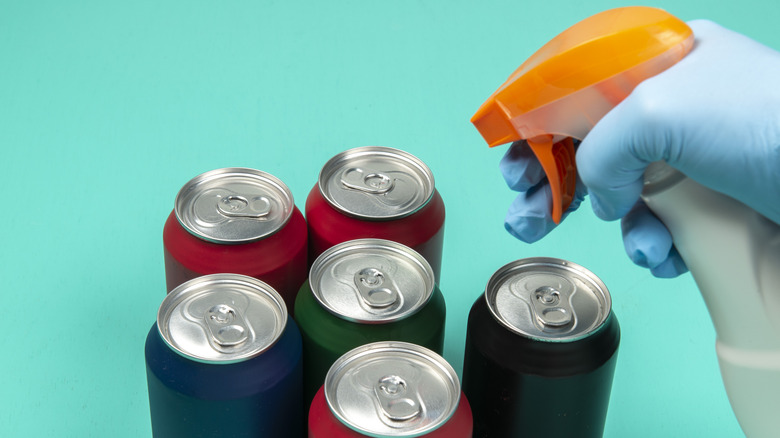10 Unsettling Facts About Diet Soda
Carbonated or soda water (not to be confused with its tonic counterpart) has been a thing since 1767, thanks to British scientist Joseph Priestley's discovery that water could absorb carbon dioxide, creating bubbles. Sixteen years later, Jacob Schweppe began to commercially produce carbonated water, paving the way for 19th-century companies Coca Cola and Pepsi.
While carbonated sodas were popular, it took until 1952, and the work of New York-based Russian businessman Hyman Kirsch, for a sugar-free version to emerge. Originally developed for diabetics, No-Cal was sweetened with cyclamate — and became a hit. Almost a decade later, Diet Rite Cola was launched by Royal Crown Cola, followed by Pepsi's Patio Diet Cola, and Coca Cola's TaB in 1963. Since then, there have been product name changes, artificial sweetener switcheroos, discontinuations, and many additions to the range of diet sodas available in 21st-century stores.
In their earliest days, diet sodas were marketed as a "healthier" drink, initially targeting American women who were keenly watching their waistlines. Today, the advertising messaging from this billion-dollar global industry has subtly shifted away from the "diet" aspect to focus on lifestyle and athleticism, with some products dropping the word entirely. But is there more to this vast range of soft drinks – which offer zero nutrition — than meets the eye? Here are unsettling facts about diet sodas.
It is really bad for your teeth and bones
We know that eating too much sugary food and drinks causes cavities, so at first glance, diet sodas seem like a brilliant alternative. No sugar means happy dentists, right? Well, studies have concluded that diet sodas don't cause cavities among children but sugar isn't the biggest problem for our teeth. Many diet sodas contain phosphoric and citric acids. The first prolongs the shelf life, while the second boosts the sharp flavor.
Our teeth may look smooth but their surface is actually made up of prism-like crystals called ameloblasts, with tiny grooves or perikymata in between. Many diet sodas have a pH of around 3 (water is a neutral 7) and their acid ingredients can weaken this arrangement of the ameloblast crystals in just five minutes, eroding the enamel. Ironically, many full-sugar sodas don't cause as much dental damage. But our teeth aren't the only things at risk from diet soda: Our bones can be affected by it, too.
While some studies have suggested there's a link between too much caffeine and osteoporosis, more pressing is the problem caused by the phosphoric acid in diet sodas. While the mineral phosphorus, found in milk, cereals, and meat is great for teeth and bone health, consuming too much phosphoric acid can weaken our bones. That's because our bodies send calcium from our bones to neutralize the acid. Researchers from Tufts University found drinking one can of diet soda a day could lead to a "dramatic" loss in bone density, per Newsweek.
Diet sodas can actually cause weight gain
Almost half the adults in the United States are obese, according to the State of Obesity Report 2025, so it's no surprise that many people turn to products that might help them achieve a healthier lifestyle. While some might say that eating or drinking everything is okay in moderation, there is evidence to suggest that, far from helping people lose weight, rather unsettlingly, diet sodas could do the opposite.
It is a complicated issue, because for some who switch from traditional to diet sodas, their desire for sweet things can be reduced. However, researchers have also found that drinking a minimum of one diet soda per day increases the risk of metabolic syndrome, a group of conditions that included high blood pressure, blood sugar, and cholesterol. Having too much tummy fat is also part of metabolic syndrome, and a 2015 study found a "striking" relationship between abdominal obesity and drinking diet soda.
Women's health is particularly at risk from gaining weight by drinking too much diet soda, according to scientists. They tend to crave more food than men after consuming artificial sweeteners, while other research has suggested that diet sodas can generally increase our appetite for food. Lab tests on animals who were fed tiny amounts of sweet foods over a period of time gained weight because their bodies braced for more sugar. When it didn't materialize, their metabolisms slowed down.
The aspartame in diet sodas increases the body's insulin levels
When the likes of No-Cal and Diet Rite Cola launched in the 1950s and 1960s, they relied on cyclamates for their sweetness. Although approved by the FDA in 1951, by 1969 they had been removed from the "generally recognized as safe" list, thanks to potential health risks. The replacement, saccharin, suffered the same fate and was quickly switched out for aspartame. Now, that artificial sweetener is at the center of a debate about its impact on people's insulin levels.
While a 2025 study that showed increased insulin among mice and monkeys that ate small amounts of aspartame has divided scientists, it's not the only research into the subject. In 2023, a first-of-its-kind study looking at aspartame and insulin in saliva concluded that participants had detectable aspartame in their saliva for up to two hours after drinking a diet soda, as well as higher levels of insulin. That's bad for our health as it could confuse the body into producing more insulin than we actually need.
If this happens too often, we're at risk of hyperinsulinemia or too much sugar in the blood. It's also connected to insulin resistance or impaired insulin sensitivity, where our organs don't react in the right way to insulin, so it builds up in our blood. Symptoms include weight gain and tiredness and, if left unchecked, can lead to pre- or Type 2 diabetes.
Artificial sweeteners also disrupt our gut health
More people than ever are aware of the need to look after their gut biome, a mix of trillions of good and bad bacteria that lives in our intestines and plays a key role in our health. Some experts compare it to a garden: When our gut biome gets foods that are nutritious, such as kefir or live yogurt, it thrives. Feed it an endless stream of junk and it won't.
It's fair to say there are other factors that can influence our gut microbiome, from our age and where we live to owning a cat or dog. Research on mice found the impact of artificial sweeteners on intestinal bacteria led to health issues including glucose intolerance and a gut imbalance known as dysbiosis. Although some research suggests that artificial sweeteners in diet soda can alter our microbiome, scientists have yet to agree that any changes are specifically because of non-nutritive sweeteners such as aspartame, rather than simply lifestyle factors.
But the artificial sweeteners in diet soda aren't the only things that could cause potential problems for our gut biome. Some of them also contain colorings and flavorings, chemical additives that may irritate the lining of our gut, while others could also disrupt the biome's healthy function. More research is needed to get conclusive answers.
Migraine sufferers are more likely to get headaches
We know why red wine might give us a headache, but migraines are still a black box for scientists. Greek philosopher Hippocrates was apparently a sufferer, and while men do experience these intense headaches, they are more common in women, due to hormonal changes. Unfortunately, anyone who is prone to migraines who also enjoys regular cans or bottles of diet soda has bad news in store.
It's not just the caffeine in diet soda that can lead to a painful headache. The aspartame that sweetens many soft drinks has been highlighted by scientists as a cause, with migraine sufferers three times more likely to have an episode after consuming aspartame. As far back as 1988, researchers noted a connection between the artificial sweetener and an increase in migraines, but what exactly is happening?
Medical experts and scientists aren't sure, but headache specialist Dr Fred Cohen believes that aspartame impacts the brain's neurotransmitters in some way. He suggested it might "interfere" with our serotonin levels or "lead to increased excitability in the brain." Until scientists know more about aspartame's impact on migraines, it might be worth giving diet soda a miss.
Diet soda can disrupt our sleep cycles
Nothing beats waking up, feeling refreshed, and ready to take on the world after a great night's sleep, but many of us rely on a jolt of caffeine to wake them up in the morning. According to the Sleep Foundation, more than 60% of people in the United States are daily consumers of caffeinated drinks, like coffee and soda, including the diet kind. But none of them are helping us get quality shuteye.
That's because caffeine prevents the body producing adenosine, a neurotransmitter which, as well as supporting our circulatory and respiratory systems, also prompts us to feel tired so we go to sleep. Once in the land of nod, scientists believe adenosine also prolongs periods of restorative, deep sleep. By blocking or limiting levels of adenosine, caffeine helps us stay awake and energized for up to six hours after we ingest it.
All of which is great if we need a wakefulness boost in the morning. However, drinking caffeine later in the day can disrupt much-needed sleep cycles. According to the Center for Science in the Public Interest, diet sodas can contain between 19 and 68 milligrams of caffeine. It's not much compared to the 75 to 150 milligrams in the K-cups used in popular single-cup coffee machines, but several cans of diet soda a day would be enough to leave you sleep deprived.
There's an increased risk of dementia and strokes
Diet sodas made with artificial sweeteners have been around long enough for several generations to enjoy them, but their staying power has also given researchers time to look into their long-term effects. Although more research is needed, there are question marks over a potential link between the artificial sweeteners in diet sodas and the likelihood of having a stroke or developing dementia.
According to a 2017 study published in Stroke, which followed adults aged over 45 for 17 years, catching up with them at regular intervals to determine their drinking habits, including fruit juices, sugar-sweetened soft drinks, and diet sodas. In what scientists described as an "intriguing" observation, artificially sweetened drinks appeared to be connected to an increased risk of stroke and dementia, but sugar-sweetened varieties did not.
Dr James Pickett, head of research at Alzheimer's Society, said the study did not prove that artificial sweeteners caused dementia, but it did shed light on "a worrying association that requires further investigation." Other health experts responded to the study by encouraging people to switch from drinking all kinds of soda to coffee or tea.
The impact of diet soda on the liver
The human liver is an amazing multi-tasker. Just two of its over 500 jobs are turning glucose into glycogen and releasing it back into the body when we need energy, and clearing our blood of toxins. Yet around ⅓ of adult Americans have nonalcoholic fatty liver disease, now known as metabolic dysfunction-associated steatotic liver disease or MASLD, and many are diagnosed when it's at an advanced stage.
The main cause of MASLD is a poor diet that allows fat to accumulate in the liver, potentially leading to the more severe metabolic dysfunction-associated steatohepatitis (MASH), which swells and damages the liver. In 2025, an unpublished study showed drinking one diet soda a day could increase the risk of MASLD by 60%. The research also revealed that people who switched from diet soda to water cut the risk by more than 15%, but choosing diet drinks over sugar-sweetened versions had no effect.
The study isn't the only one to sound the alarm about diet sodas and their impact on our liver. In 2008, scientists examined all soft drinks, including diet sodas, to assess what role they played in fatty liver disease. The conclusion encouraged people to "change their longstanding drinking behaviour."
Artificial sweeteners' links to heart disease and type 2 diabetes
When diet sodas first launched, they were primarily aimed at women who wanted to have or maintain a slim figure, and much was made of their very low calorie count. Fast forward a few decades and 21st-century advertisers, keen to attract the widest possible consumer base, dropped the "diet" aspect of their drinks in favor of a sportier, active lifestyle approach. However, scientists have made an unsettling link between artificial sweeteners, such as those found in diet sodas, and heart disease.
The principal findings of a large-scale study, published in 2022, suggested that drinking lots of diet sodas containing artificial sweeteners could be linked to an increased risk of developing cardiovascular disease. The researchers also pointed to other studies which had reached similar conclusions, including a review from the World Health Organization, which warned of potential heart health problems for people who regularly drank diet sodas over the long term.
More unsettling, especially for anyone relying on diet sodas to satisfy their sugar cravings, is the link between artificial sweeteners and type 2 diabetes mellitus (T2DM). As far back as 2013, European researchers identified a connection between diet sodas (as well as traditional drinks) and the likelihood of developing T2DM. In 2025, a review of research to date said there was "comparatively overwhelming" information suggesting artificial sweeteners increased the risk of T2DM, but added that more work was needed because of the "lack of specificity" about which sweeteners had been studied.
Diet soda is a great household cleaning tool
There are lots of facts about the impact of diet sodas — more specifically their artificial ingredients, such as sweeteners — on our bodies. But arguably the most unsettling of all is about what these drinks can do to inanimate objects. Many people use kitchen ingredients to clean their homes, from keeping the fridge water dispenser spick and span to getting burned food off your favorite pan, but among the most effective are diet sodas.
One Wisconsin homeowner posted on social media about how Diet Coke helped lift tar paper from their floor, while other internet users have said it removed soap scum from showers, helped lift blood and grease stains out of clothes, and was effective at removing rust from metal. Diet soda can even unclog a drain, get gum out of hair, and clean an engine. All of which sounds great if you're in a pinch and need a cleaning hack. But what gives?
It's all down to the phosphoric and citric acids present in many diet sodas — remember those two ingredients that can be so bad for our teeth? They are also found in many cleaning products, including bathroom cleaners, all-purpose products, and laundry detergents. The phosphoric and citric acids help them do their particular jobs, eliminating dirt or grease and leaving whatever they're used on clean and sparkling. While that's great, the big question for people who love a low-calorie drink is: What impact are diet sodas having on our insides?
